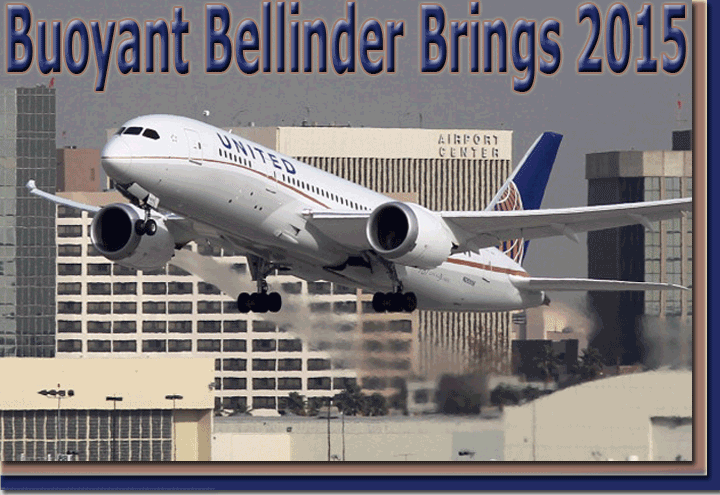
Lucky
7—When Jim Bellinder was named Vice President,
United Cargo Sales on January 7, 2013 (exactly two years ago today),
he assumed command, leveraging 26 years of experience in Continental
Airlines and United Cargo Sales.
He needed that experience and more, as
we all know now.
UA Cargo was going through a baptism of
fire, combining the resources of the two aforementioned carries—with
all the attendant difficulties associated with that kind of effort—while
also adding new systems, opening new facilities, and dealing with a
declining cargo business.
Today the story has changed dramatically,
and as 2015 dawns, this hands-on air cargo guy who began his airline
career as a Cargo General Sales Agent in Chicago, then progressed to
Area Sales Manager, International Sales Manager, Regional Sales Manager,
Regional Sales Director, and Continental Cargo’s Director of Cargo
Sales – Americas, can approach this month and year with great
hope and enthusiasm.
January has always been a signature month
for Jim; in January 2011, following the United-Continental merger, he
assumed the post as the first Director of Cargo Sales at UA.
Revenue
Up 19.1% in 2014
“I’m happy to say United Cargo
is in a much better place at the start of 2015 than we were at this
time a year ago.
“We posted some pretty encouraging
numbers in 2014: revenue grew 19.1 percent year-over-year in the third
quarter and volumes were up 23.2 percent in the same period.
“Of course, we’re not fooling
ourselves—we were able to achieve such a high percentage of increases
because of the hit we took when we implemented our new cargo technology
systems in the last half of 2013.
“But the most profound change from
12 months ago goes beyond numbers.
“As 2014 progressed, we were able
to regain our customers’ trust in our ability to deliver on our
promises.
“Because of that, we have reestablished
our own team’s confidence and pride in the service we provide.”
 |
Opportunities
Abounding
“Another reason our team is confident
as we move into 2015 is that most of the worldwide economic indicators
that impact air freight are trending positive.
“To cite two examples: final returns
aren’t in, but 2014 should be the first year since 2010 in which
freight volumes grow at a greater rate than capacity.
“Also, in IATA’s forward-looking
report issued in December, they state that global GDP is expected to
grow by 3.2 percent in 2015, which will be the first time above 3.0
percent since 2010.”
Taking
Nothing For Granted
“But United Cargo’s confidence,
along with the improving conditions, doesn’t mean we expect to
just sit back and watch the business roll in.
“It means there is great opportunity
for the organization that is creative and accommodating enough to capture
the business, then deliver operational results consistently and in a
way that makes the customer look good.
“Looking at regional and country-level
growth, United Cargo is very encouraged by developments in the China
market.
“China has shown great progress
as an import market in the past few years—a complement to their
ongoing importance as a manufacturing center and a source of exports.
“United has the largest China-U.S.
network, and retaining and benefitting from this leadership position
is a key to our growth plans.
“We now operate direct flights between
the U.S. and Beijing, Shanghai, Taipei, Hong Kong, and Chengdu, and
we continue to explore adding capacity and new cities to our China service.”
Dreamliner A Dream?
“The 787 Dreamliner has been a boon
to United Cargo because its unique size and greater fuel efficiency
has opened up new markets United could not profitably serve with other
aircraft.
“These include Houston-Lagos, Denver-Narita,
and San Francisco-Chengdu.
“SFO-CTU is a particularly good
example, because the 787 allowed us to operate not only the first service
by a U.S. airline in Chengdu, but the first service by a U.S. airline
in mainland China beyond Beijing and Shanghai.
“We had high hopes (no pun intended)
for Chengdu’s potential as a cargo market, and the first six months
of service have fulfilled our expectations.
“B787 brought even more to the table
late in October when we began to operate the world’s longest regular
787 route: Los-Angeles-Melbourne.
“This service takes advantage of
the greater range of the 787-9 ‘stretch’ version.”
Getting
Back To Basics
“We've had limited focus recently
on the development of any new products. This is in line with our belief
that the most important thing is to ensure we continue to execute “the
basics” of our business at an excellent level of quality.
“Our longer-term goals are to develop
new features and enhancements for our specialty products—including
TempControl, EXP Express, QuickPak and UASecure—to ensure these
services deliver exactly what our customers need.
“In 2014, our product enhancements
were focused on TempControl, our premium product for the transport of
pharmaceuticals and other temperature-sensitive shipments.
“We expanded our global TempControl
network and recently reached the 50-location milestone.
“Earlier last year, we launched
our ‘Control Tower’ for the planning and management of TempControl.
“This approach involves a focused
team of specialists who provide customers a single point of contact
through all phases of their shipment’s lifecycle.
“We also became the first U.S. carrier
to accept Envirotainer RKN e1 temperature control container following
the FAA’s approval in July.
“In addition, we also introduced
two new service options for customers shipping temperature-sensitive
cargo: EZ Passive and EZ Active.
“These options allow customers to
book and ship TempControl immediately without waiting for a customized
set of processes to be approved.”
Time To
‘Fess Up About UA
“We know that United Cargo in a
highly competitive, ever-changing market needs to be very flexible.
“We have changed for good.
“It’s not just about one or
two aspects of our offering either.
“We’ve made it clear to every
member of our team that we will do what’s right for the customer
first, and we will never take any shipment for granted.
“Our customers and service partners
and others that may be considering our services need to know that we
are doing business in this manner everyday.
“We've shifted our priorities toward
exploring the benefits of long-term strategic partnerships with our
customers rather than obtaining the benefits of any single deal.
“Think of us first when you as a
customer are proposing something that needs unconventional thinking
or a fresh perspective.
“We know the supply chain, as well
as our customers’ needs, are evolving in ways we can’t predict.
“That’s why we’re empowering
our people to make decisions that generate fresh and creative solutions.”
An Industry
for Everybody
It being the beginning of a new year, we asked
Jim Bellinder what he would like to see happen to air cargo on an industry
basis. In regards to what the industry can do better, Jim had a lot
to say.
“It’s no secret that recent
years have been a very challenging time in the air cargo industry. Businesses
that are struggling to survive tend not to spend a lot of time and resources
on long-term developments that benefit the industry as a whole. Now
that the outlook is a bit brighter, we need to get traction on a number
of lingering issues.
“The recent progress on the expansion
of e-AWB is an example of the positive things that happen when necessity,
benefit, and consensus come together. I think our industry needs a similar
innovative and comprehensive response to the issue of modal shift. We
all believe in the advantages of air cargo versus other modes, and there
are several ways we can work together to both maximize and publicize
these advantages.”
Why Air
Cargo?
As with everyone we interview, we’re
curious as to how Jim’s path veered towards air cargo, and what
keeps him here.
“I met some really terrific people
from Northern Air Freight in 1985.
“They explained to me, with excitement
and enthusiasm, how the air cargo business worked.
“Shortly after that I had the opportunity
to begin working for the Cargo Development Group as a GSA for Continental
Airlines in Chicago.
“I've been working in air cargo
since then.
“I love that air cargo is all about
the quality of the individuals who work in this great business of ours.
“I really enjoy working with my
colleagues at United Airlines and interacting with industry associates
from around the globe.
“Another key factor that keeps me
in air cargo is the feeling of accomplishment that comes with collaborating
with our team and our customers to find a creative and effective way
to meet the customers' needs.
“Feeling like I've made a difference
in a positive way reinforces my commitment to the company and the industry.
“Air cargo is a dynamic industry—sometimes
simple, other times complex—that can lead to a long-lasting vocation.
I would tell anyone thinking of entering this great industry in 2015
and beyond to start at the bottom and work your way up, respecting the
importance of each job you have and learning everything you can at every
level.
“You will have a career of which
you can be proud,” Jim Bellinder said.
As Jim spoke, in my aviation mind the
word ‘proud’ connected to “Proud Bird,” a great
hangout and place to watch the birds at LAX, and, if memory serves,
Proud Birds was also a now-forgotten ad phrase from the old CO.
Always loved the bump line from that 1970s
ad campaign:
“We really move our tail for you.”
All things considered, today the ad might
seem passé.
But proud people building the new United
Cargo are making that great airline look better everyday.
Geoffrey





